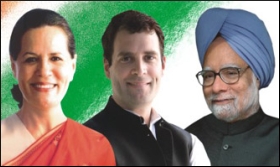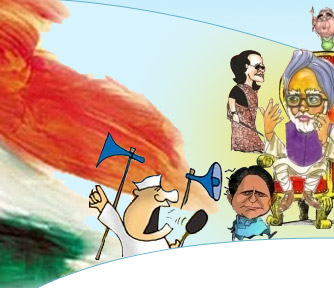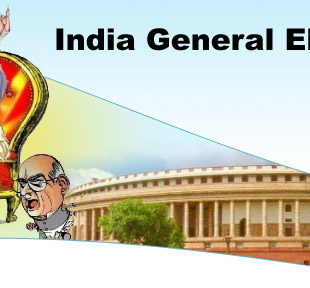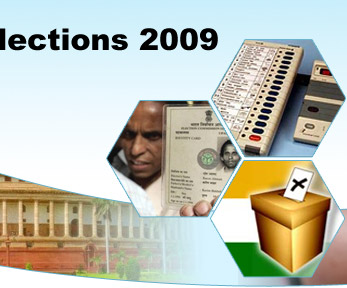|

|
Vote for development will ensure economy tops government agenda
|
|

|
|
| Top Stories |
 |
|
|
|
Sushma Ramachandran | 23 May, 2009
With the mandate for the Congress party-led United Progressive Alliance (UPA) clearly in favour of development, economic issues will top the agenda of the new government, as it seeks to meet the high expectations of the poor and homeless and fulfil the aspirations of the masses as quickly as possible.
The new cabinet will be undoubtedly charged by Prime Minister Manmohan Singh to come up with measures to revitalise an economy which is grappling with the adverse effects of global slowdown. And it is also equally clear that providing food and shelter will be the key objectives of the government's strategy under the economist prime minister.
The task is, indeed, enormous. While there is little likelihood of a significant revival of the Indian economy till the global downturn is reversed, the plus point is the high confidence level of foreign institutional investors and the corporate sector. This was evident on a large measure when stock markets gave a resounding vote in favour of the coalition, lifting key indices to such dizzy heights that circuit breakers were breached and trading had to be halted to curb excessive speculation. But this is a fragile kind of support that can be withdrawn quickly in case there are any signs over the next few months that the economy is not going on a steady growth path.
In anticipation of the need for a smooth changeover, the Prime Minister's Office, led by Principal Secretary T.K.A. Nair, had already begun working on a plan outlining the key areas needing immediate attention of the new government. In fact, once it became clear that a Congress-led coalition was coming back, Cabinet Secretary K.M. Chandrashekhar also wasted no time in calling upon all ministries and departments to list the details of programmes and policies that need high priority.
The advantage of continuity in leadership is also that the bureaucracy knows Manmohan Singh works at a punishing pace and it will have to work hard to meet his high standards of performance. Having been a bureaucrat himself, top officials know they will not be able to pull the wool over his eyes as they are wont to do with many other politicians.
What are the areas that the new government will now focus on? The plan that will be on top of the economic agenda is unveiling of a fresh stimulus package to give a boost to growth. This will come on the heels of the three previous packages. The aim will be to provide a push to spending, mainly on infrastructure, to stimulate domestic demand.
Last year's economic growth dipped from the high 9 percent recorded in the previous few years. So the effort will be to ensure at least 6 percent growth this fiscal, although Congress leaders have been talking of 7-9 percent, which appears somewhat unrealistic at this stage. Exports are also an area of concern and the external economic environment is critical to any improvement in the situation.
Apart from the stimulus package, another area that will stand high on the list is the National Rural Employment Guarantee Scheme, which has proved to be a vote getter in many states. Media reports as well as the Congress party's own assessment has shown that the scheme made a vital difference to the voting pattern in many constituencies.
The Congress has made a commitment in its manifesto to expand the programme from 100 days work per family to 100 days per individual. But any increase in the scope of the scheme would have to be accompanied by a review of the programme to remove any defects and speed up the progress of projects.
The Bharat Nirman (building India) programme is also expected to be given top priority, especially the schemes to build rural roads. Massive funding will be needed for these schemes but their implementation is essential to bring the fruits of development to the remotest regions of the country.
Agriculture is equally high on priority, especially since farmers have backed the UPA policies in a big way. The loan waiver scheme, much criticised by economists for being overly populist, is reported to have had a big impact on farmers who would have otherwise faced a huge financial burden of repayment along with crop losses. The government will have to place farmers' issues high on the agenda as long-term credit and input issues needs to be resolved though farmers' suicides have abated to some extent.
The related issues of food prices and subsidies have to be taken up simultaneously, though this may be helped by the fact that a normal monsoon has been predicted for this year as well. Food prices have remain stubbornly high at the consumer level despite the fact that a dip has been recorded in the inflation rate based on wholesale price index. Clearly, distribution is a major area that needs to be dealt with in this context, as well as improved agricultural productivity levels. The problem of burgeoning subsidies is also one that will have to be faced by the government while it struggles to bridge the fiscal deficit.
The UPA government must have realised that the firm mandate given by the electorate implies that it has a huge responsibility to perform on the economic front. The fact that it has rejected the politics of hate and communalism that were tacitly supported by some opposition has made it clear that the electorate is looking for rapid economic development. The support given to the Congress party also appears to be a tribute to the clean image projected by Manmohan Singh who is well known as the architect of economic reforms.
The economy thus has to be uppermost on the government's agenda despite the need to tackle other pressing issues like the Maoist menace and terrorism. It knows that it has been given just five years to improve the lot of the "aam aadmi" - the average Indian. If it fails, it will have to bite the dust in the next general elections. The message given by the Indian voter to the Congress and its allies is unequivocal - perform or perish in the next round.
*
The views expressed by the author in this feature are entirely the
author's own and do not necessarily reflect the views of SME Times.
|
|
|
| |
|
|
|
|
|
|
|
|
|
|
|


